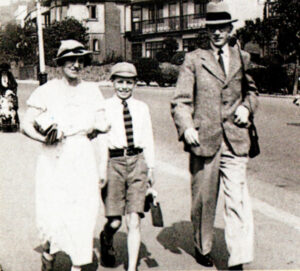
You put your luggage into the car boot then, at the airport, transfer it on to a trolley. At your destination you grab your bags from the carousel and load them on to another trolley. You push this out of the airport building to a taxi, or coach, that will take you to your hotel. When you get there, if you are unlucky, you might have to carry your luggage into the hotel – even, perhaps, to your room.
All this handling of luggage didn’t bother my parents in the 1930s. When we went on holiday in those days our luggage preceded us. We had a trunk more than three feet wide into which my mother would pack clothes for the three of us to cover all eventualities – rain, cold or heatwave. Locked and tied around with rope, the trunk would await the carrier, usually Carter Patterson. They could be contacted at local shops, or you could display a card with the letters CP in your front window and a passing van would call. The next time you saw the trunk it was at your boarding house.
Just occasionally, things would go wrong. On one holiday we arrived at the boarding house on a Saturday to find that the trunk hadn’t come. My father was irate, and went back to the railway station to complain. However, the trunk was delivered on the Monday and at last we were able to change our clothes.
Holiday destinations were Clacton-on-Sea, Cliftonville and many South Coast resorts. My main interest was the beach, and armed with a bucket and spade I would play happily for hours on the sand. One unpleasant outcome of this was that, because of my fair skin, I was subject to sunburn. Whether there weren’t as many sunblock lotions available in those days or whether my mother didn’t know about them Ijust don’t know. What I do remember is how painful my legs and shoulders used to get, and the treatment of dabbing calamine lotion on them to relieve the burning.
I can’t remember much about the boarding houses where we stayed, or the food they provided, although I do recall that the arrangement at some of them was for the boarders to supply the fish or meat for the main meal of the day. At one establishment the same hard rock cakes seemed to be dished up at every meal. We used to joke about it for years afterwards. The only holiday address I remember staying at was in Dundonald Drive at Leigh-on-Sea. Perhaps the reason for being able to recall this is because we spent two holidays there, and my parents became quite friendly with the landlady, a Mrs. Long. Sometimes, along with her son Paul, who was around my age, she would come down on the beach with us.
On the journey from Dundonald Drive down to the beach we had to pass Chalkwell station, outside which a street photographer stood on the pavement. He had one of those old wooden movie cameras on a tripod, and turned the handle to take the still photograph. My parents bought a picture of us walking along the road from him, but he still filmed us every time we passed him.
Every seaside resort has a bandstand. My parents loved to sit and listen to the band playing, but I wasn’t so keen. So far as I was concerned we were using up good beach time. Today, however, I feel differently, and love to sit and listen to the band. Alas, there aren’t so many military bands around as there were in those days.
After our annual fortnight’s holiday was over, clothes and buckets and spades were packed away in the trunk and we journeyed home by train, unencumbered by luggage. A few days after we’d arrived home, the trunk would be delivered to our doorstep. Travelling seemed so much simpler then.
Peter Pitt








